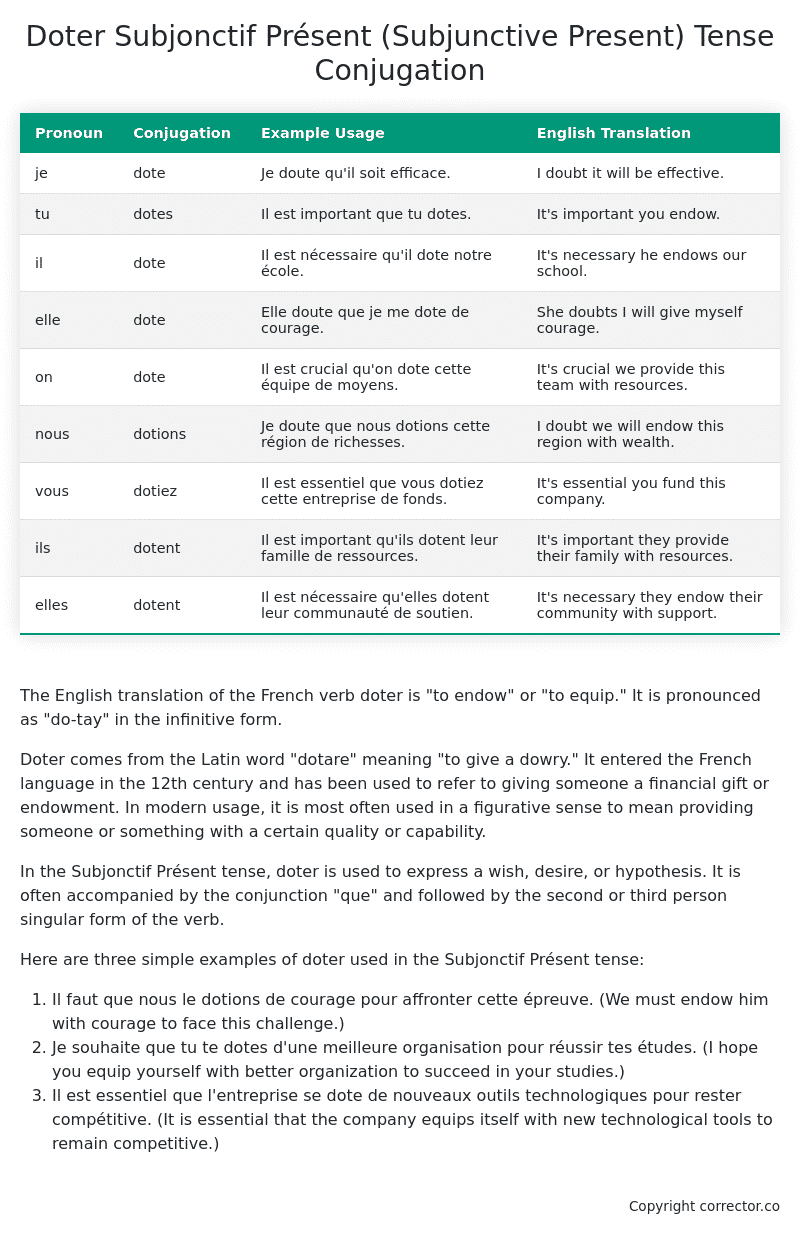Subjonctif Présent (Subjunctive Present) Tense Conjugation of the French Verb doter
Introduction to the verb doter
The English translation of the French verb doter is “to endow” or “to equip.” It is pronounced as “do-tay” in the infinitive form.
Doter comes from the Latin word “dotare” meaning “to give a dowry.” It entered the French language in the 12th century and has been used to refer to giving someone a financial gift or endowment. In modern usage, it is most often used in a figurative sense to mean providing someone or something with a certain quality or capability.
In the Subjonctif Présent tense, doter is used to express a wish, desire, or hypothesis. It is often accompanied by the conjunction “que” and followed by the second or third person singular form of the verb.
Here are three simple examples of doter used in the Subjonctif Présent tense:
- Il faut que nous le dotions de courage pour affronter cette épreuve. (We must endow him with courage to face this challenge.)
- Je souhaite que tu te dotes d’une meilleure organisation pour réussir tes études. (I hope you equip yourself with better organization to succeed in your studies.)
- Il est essentiel que l’entreprise se dote de nouveaux outils technologiques pour rester compétitive. (It is essential that the company equips itself with new technological tools to remain competitive.)
Table of the Subjonctif Présent (Subjunctive Present) Tense Conjugation of doter
| Pronoun | Conjugation | Example Usage | English Translation |
|---|---|---|---|
| je | dote | Je doute qu’il soit efficace. | I doubt it will be effective. |
| tu | dotes | Il est important que tu dotes. | It’s important you endow. |
| il | dote | Il est nécessaire qu’il dote notre école. | It’s necessary he endows our school. |
| elle | dote | Elle doute que je me dote de courage. | She doubts I will give myself courage. |
| on | dote | Il est crucial qu’on dote cette équipe de moyens. | It’s crucial we provide this team with resources. |
| nous | dotions | Je doute que nous dotions cette région de richesses. | I doubt we will endow this region with wealth. |
| vous | dotiez | Il est essentiel que vous dotiez cette entreprise de fonds. | It’s essential you fund this company. |
| ils | dotent | Il est important qu’ils dotent leur famille de ressources. | It’s important they provide their family with resources. |
| elles | dotent | Il est nécessaire qu’elles dotent leur communauté de soutien. | It’s necessary they endow their community with support. |
Other Conjugations for Doter.
Le Present (Present Tense) Conjugation of the French Verb doter
Imparfait (Imperfect) Tense Conjugation of the French Verb doter
Passé Simple (Simple Past) Tense Conjugation of the French Verb doter
Passé Composé (Present Perfect) Tense Conjugation of the French Verb doter
Futur Simple (Simple Future) Tense Conjugation of the French Verb doter
Futur Proche (Near Future) Tense Conjugation of the French Verb doter
Plus-que-parfait (Pluperfect) Tense Conjugation of the French Verb doter
Passé Antérieur (Past Anterior) Tense Conjugation of the French Verb doter
Futur Antérieur (Future Anterior) Tense Conjugation of the French Verb doter
Subjonctif Présent (Subjunctive Present) Tense Conjugation of the French Verb doter (this article)
Subjonctif Passé (Subjunctive Past) Tense Conjugation of the French Verb doter
Subjonctif Imparfait (Subjunctive Imperfect) Tense Conjugation of the French Verb doter
Subjonctif Plus-que-parfait (Subjunctive Pluperfect) Tense Conjugation of the French Verb doter
Conditionnel Présent (Conditional Present) Tense Conjugation of the French Verb doter
Conditionnel Passé (Conditional Past) Tense Conjugation of the French Verb doter
L’impératif Présent (Imperative Present) Tense Conjugation of the French Verb doter
L’infinitif Présent (Infinitive Present) Tense Conjugation of the French Verb doter
Struggling with French verbs or the language in general? Why not use our free French Grammar Checker – no registration required!
Get a FREE Download Study Sheet of this Conjugation 🔥
Simply right click the image below, click “save image” and get your free reference for the doter Subjonctif Présent tense conjugation!

Doter – About the French Subjonctif Présent (Subjunctive Present) Tense
Formation of the Subjonctif Présent
Common Everyday Usage Patterns
Interactions with Other Tenses
Summary
I hope you enjoyed this article on the verb doter. Still in a learning mood? Check out another TOTALLY random French verb conjugation!


